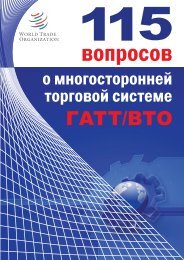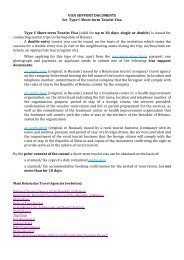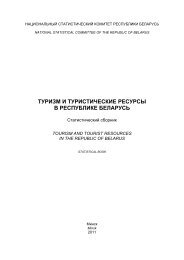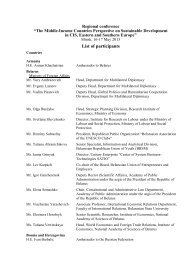Human Development Report 2013 - UNDP
Human Development Report 2013 - UNDP
Human Development Report 2013 - UNDP
You also want an ePaper? Increase the reach of your titles
YUMPU automatically turns print PDFs into web optimized ePapers that Google loves.
TABLE 1.3Inequality and satisfaction with freedom of choice and communityHDI group and regionHDI groupOverall loss inHDI value due toinequality, 2012 (%)Satisfactionwith freedom ofchoice, 2007–2011 a(% satisfied)of choice. Subjective data can provide an insightinto the state of social integration withina country or community. Evidence suggests asmall negative correlation between losses dueto inequality and satisfaction with freedomof choice and with the community. Evidencealso suggests that people in countries with ahigh HDI value are generally more satisfiedwith their freedom of choice and with thecommunity. Exploring these associations canoffer important policy lessons for countries(table 1.3).<strong>Human</strong> securitySatisfaction withcommunity, b2007–2011 a(% answering yes)Very high human development 10.8 81.5 85.9High human development 20.6 66.3 76.4Medium human development 24.2 77.8 79.9Low human development 33.5 61.8 72.2RegionArab States 25.4 54.6 67.6East Asia and the Pacific 21.3 78.7 c 80.1 cEurope and Central Asia 12.9 58.5 76.5Latin America and the Caribbean 25.7 77.9 79.0South Asia 29.1 72.9 83.2Sub-Saharan Africa 35.0 69.1 65.2World 23.3 73.9 79.0a. Data refer to the most recent year available during the period specified.b. Based on the Gallup survey question on overall satisfaction with city.c. Value is not displayed in the statistical tables because data are not available for at least half the countries covering at leasttwo-thirds of the population of the group.Source: Overall loss in HDI value due to inequality, HDRO calculations based on the Inequality-Adjusted HDI; satisfaction withfreedom of choice and community, HDRO calculations based on Gallup (2012).The 1994 <strong>Human</strong> <strong>Development</strong> <strong>Report</strong> arguedthat the concept of security must shift from theidea of a militaristic safeguarding of state bordersto the reduction of insecurity in people’sdaily lives (or human insecurity). 54 In everysociety, human security is undermined by avariety of threats, including hunger, disease,crime, unemployment, human rights violationsand environmental challenges. The intensityof these threats differs across the world, buthuman security remains a universal quest forfreedom from want and fear.Consider economic insecurity. In the countriesof the North, millions of young peopleare now unable to find work. And in theSouth, millions of farmers have been unableto earn a decent livelihood and forced to migrate,with many adverse effects, particularlyfor women. Closely related to insecurity inlivelihoods is insecurity in food and nutrition.Many developing country householdsfaced with high food prices cannot affordtwo square meals a day, undermining progressin child nutrition. Another major cause ofimpoverishment in many countries, rich andpoor, is unequal access to affordable healthcare. Ill health in the household (especiallyof the head of the household) is one of themost common sources of impoverishment,as earnings are lost and medical expenses areincurred.Perspectives on security need to shift from amisplaced emphasis on military strength to awell rounded, people-centred view. Progress inthis shift can be gleaned in part from statisticson crime, particularly homicides, and militaryspending.CrimeFreedom from fear should be reflected in lowcrime rates, specifically low homicide rates.A few studies have also used homicide ratesto assess civic engagement and trust. 55 The2012 Caribbean <strong>Human</strong> <strong>Development</strong> <strong>Report</strong>,for example, argues that violent crime erodesconfidence in future development prospects,reduces the competitiveness of industries andservices by imposing burdensome securitycosts and damages the investment climate.Crime may also lead to a brain drain from thecountry or affected community. And divertingresources to control crime reduces the fundsavailable to invest in health care and education,thus slowing social integration and dampeningdevelopment. 56In recent years, the global average homiciderate for 189 countries with data was6.9 per 100,000 people, 57 with a low of 0in Monaco and a high of 91.6 in Honduras38 | HUMAN DEVELOPMENT REPORT <strong>2013</strong>
















